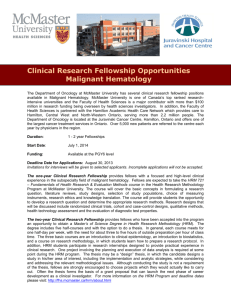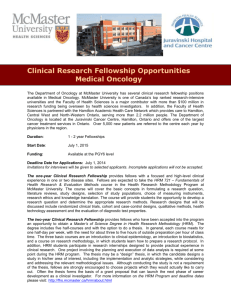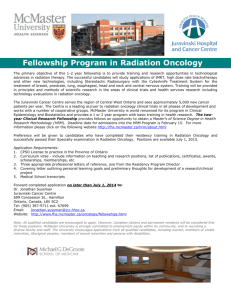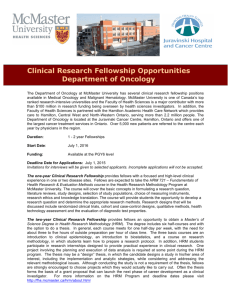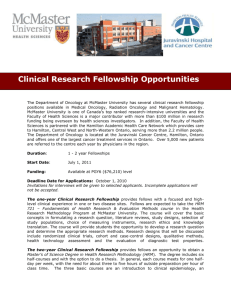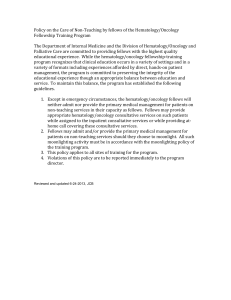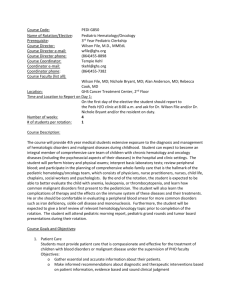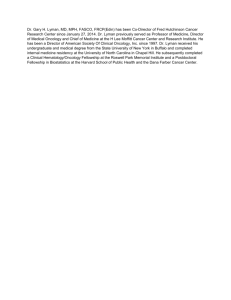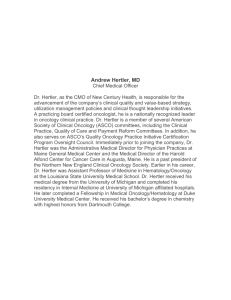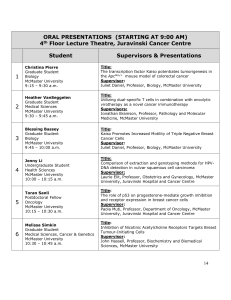Fellowship Opportunities in the Department of Oncology, Faculty of
advertisement
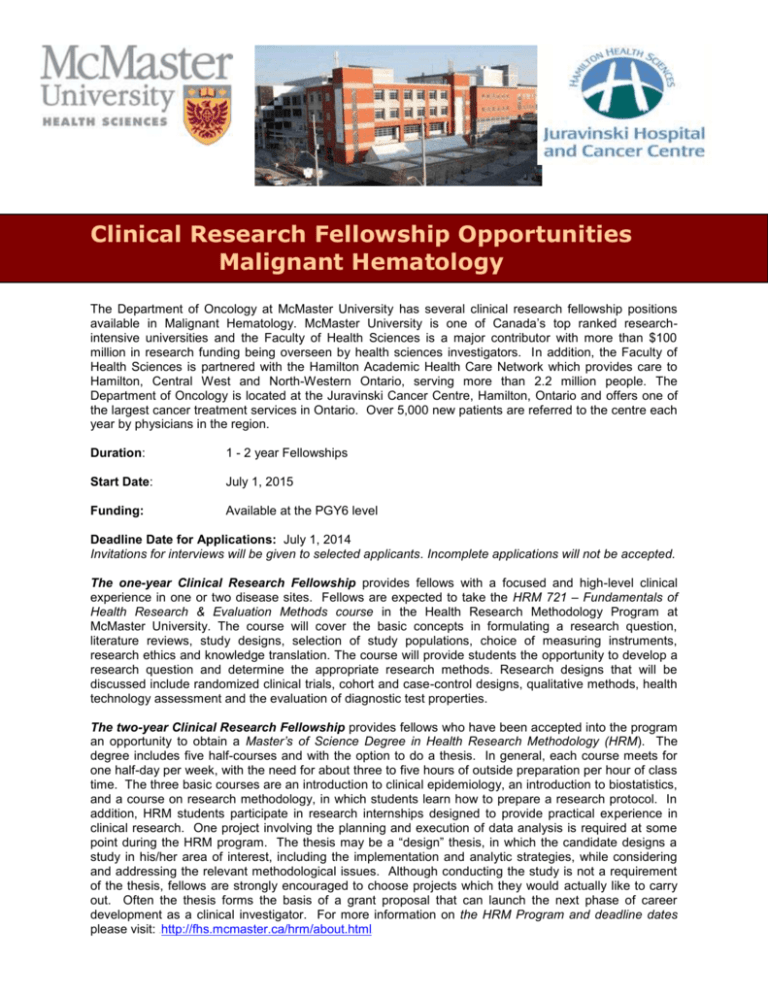
Clinical Research Fellowship Opportunities Malignant Hematology The Department of Oncology at McMaster University has several clinical research fellowship positions available in Malignant Hematology. McMaster University is one of Canada’s top ranked researchintensive universities and the Faculty of Health Sciences is a major contributor with more than $100 million in research funding being overseen by health sciences investigators. In addition, the Faculty of Health Sciences is partnered with the Hamilton Academic Health Care Network which provides care to Hamilton, Central West and North-Western Ontario, serving more than 2.2 million people. The Department of Oncology is located at the Juravinski Cancer Centre, Hamilton, Ontario and offers one of the largest cancer treatment services in Ontario. Over 5,000 new patients are referred to the centre each year by physicians in the region. Duration: 1 - 2 year Fellowships Start Date: July 1, 2015 Funding: Available at the PGY6 level Deadline Date for Applications: July 1, 2014 Invitations for interviews will be given to selected applicants. Incomplete applications will not be accepted. The one-year Clinical Research Fellowship provides fellows with a focused and high-level clinical experience in one or two disease sites. Fellows are expected to take the HRM 721 – Fundamentals of Health Research & Evaluation Methods course in the Health Research Methodology Program at McMaster University. The course will cover the basic concepts in formulating a research question, literature reviews, study designs, selection of study populations, choice of measuring instruments, research ethics and knowledge translation. The course will provide students the opportunity to develop a research question and determine the appropriate research methods. Research designs that will be discussed include randomized clinical trials, cohort and case-control designs, qualitative methods, health technology assessment and the evaluation of diagnostic test properties. The two-year Clinical Research Fellowship provides fellows who have been accepted into the program an opportunity to obtain a Master’s of Science Degree in Health Research Methodology (HRM). The degree includes five half-courses and with the option to do a thesis. In general, each course meets for one half-day per week, with the need for about three to five hours of outside preparation per hour of class time. The three basic courses are an introduction to clinical epidemiology, an introduction to biostatistics, and a course on research methodology, in which students learn how to prepare a research protocol. In addition, HRM students participate in research internships designed to provide practical experience in clinical research. One project involving the planning and execution of data analysis is required at some point during the HRM program. The thesis may be a “design” thesis, in which the candidate designs a study in his/her area of interest, including the implementation and analytic strategies, while considering and addressing the relevant methodological issues. Although conducting the study is not a requirement of the thesis, fellows are strongly encouraged to choose projects which they would actually like to carry out. Often the thesis forms the basis of a grant proposal that can launch the next phase of career development as a clinical investigator. For more information on the HRM Program and deadline dates please visit: http://fhs.mcmaster.ca/hrm/about.html HU U The primary objective of a 1-2 year fellowship in Malignant Hematology is to provide clinical and research training opportunities across the spectrum of acute and chronic leukemia, marrow failure syndromes, lymphoproliferative disorders, plasma cell neoplasms, and stem cell transplantation. The Division of Malignant Hematology is comprised of 9 full-time members with specific subspecialty and research expertise covering a broad range of hematologic malignancies including an active, FACT approved allogeneic (35/year) and autologous (70/yr) stem cell transplant program. Specific research strengths include basic laboratory/translational studies with a focus on stem cell biology and tumour immunology, active involvement in Phase I/II/III clinical trials across all disease subtypes and with national leadership roles in the fields of leukemia and stem cell transplantation, active participation and leadership in the Program for Evidence-based Care (PEBC) Hematology Disease Site Group of Cancer Care Ontario (CCO), and Health Services Research. Opportunities exist for fellows to obtain formal graduate training (MSc) in Health Research Methodology through McMaster University’s renowned Department of Clinical Epidemiology and Biostatistics, and to lead the development of a practice guideline for the CCO-PEBC For more information on our Oncology Fellowship Programs please click on link below: http://fhs.mcmaster.ca/oncology/fellowships.html Application Requirements: (Please note: Incomplete applications will not be accepted) 1. Must have completed Hematology subspecialty 2. CPSO licensing to practice in the Province of Ontario 3. Curriculum vitae - include information on teaching and research positions, list of publications, certificates, awards, scholarships, memberships, etc 4. Three appropriate professional letters of reference, one from the Residency Program Director 5. Covering letter outlining personal learning goals and preliminary thoughts for development of a research/clinical project 6. Medical School transcripts Forward completed application no later than July 1, 2014 to: U U Malignant Hematology Fellowship Dr. Graeme Fraser Department of Oncology Juravinski Cancer Centre 3rd Floor 699 Concession Street Hamilton, Ontario, L8V 5C2 Graeme.fraser@jcc.hhsc.ca Fax: 905-575-6326 HHU U Note: All qualified candidates are encouraged to apply. However, Canadian citizens and permanent residents will be considered first for these positions. McMaster University is strongly committed to employment equity within its community, and to recruiting a diverse faculty and staff. The University encourages applications from all qualified candidates, including women, members of visible minorities, Aboriginal peoples, members of sexual minorities and persons with disabilities.
